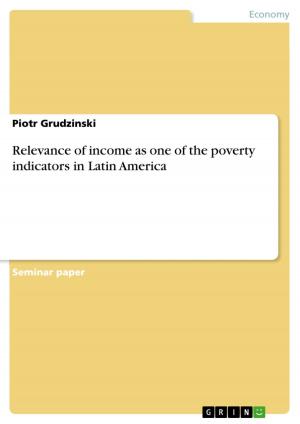| Author: | Desirée Kuthe | ISBN: | 9783638822220 |
| Publisher: | GRIN Publishing | Publication: | July 18, 2007 |
| Imprint: | GRIN Publishing | Language: | English |
| Author: | Desirée Kuthe |
| ISBN: | 9783638822220 |
| Publisher: | GRIN Publishing |
| Publication: | July 18, 2007 |
| Imprint: | GRIN Publishing |
| Language: | English |
Essay from the year 2007 in the subject American Studies - Culture and Applied Geography, grade: 1,0, University of Córdoba (Spain: Universidad de Córdoba), course: Sociolinguistics, 8 entries in the bibliography, language: English, abstract: African American Vernacular English or AAVE, which is also variously labelled 'African American English', 'Black English', 'Black Vernacular English' or 'Ebonics', is the non-standard variety of English spoken by many African Americans, at least to some extent and in some contexts. The now very popular term Ebonics is a portmanteau of the words 'ebony' and 'phonics', created in 1973 by a group of black scholars, who disliked the term 'Nonstandard Negro English', which was in use at that time. The circumstances of the creation of the term, (which has gained considerable popularity during a huge debate in 1996, which will be discussed later), already highlights one of the main features associated with AAVE: the controversies which centre upon it, 'even' - according to McCrum et al. - 'within the Black community. For some, it is an authentic means of self-expression for Black English speakers throughout America and the world. For others, who prefer the norms of Standard English, Black English represents the disadvantaged past, an obstacle to advancement, something better unlearned, denied or forgotten.' The first thorough sociolinguistic study of AAVE was carried out by William Labov in 1968. It was funded by the US Office of Education, which was interested in 'the relation between social dialects and the teaching of English.' The problems many Black American children had to acquire thorough reading skills was, in fact, what first brought attention to AAVE. Still scholars can't seem to agree on what exactly AAVE is and where it comes from. Scholars on one end of the scale of opinions hold it to be very different from Standard English, even a distinct language, those on the other end claim it to be a mere product of regional and socio-economical differences between Blacks and Whites. These two aspects will be the main points of interest in this paper. After a rough linguistic description of the dialect I'm going to turn to its possible history, before finally concluding with a short outline of the main sociolinguistic aspects surrounding AAVE, including the educational problems it presents, which have, after all, been the catalyst for linguistic interest in the dialect.
Essay from the year 2007 in the subject American Studies - Culture and Applied Geography, grade: 1,0, University of Córdoba (Spain: Universidad de Córdoba), course: Sociolinguistics, 8 entries in the bibliography, language: English, abstract: African American Vernacular English or AAVE, which is also variously labelled 'African American English', 'Black English', 'Black Vernacular English' or 'Ebonics', is the non-standard variety of English spoken by many African Americans, at least to some extent and in some contexts. The now very popular term Ebonics is a portmanteau of the words 'ebony' and 'phonics', created in 1973 by a group of black scholars, who disliked the term 'Nonstandard Negro English', which was in use at that time. The circumstances of the creation of the term, (which has gained considerable popularity during a huge debate in 1996, which will be discussed later), already highlights one of the main features associated with AAVE: the controversies which centre upon it, 'even' - according to McCrum et al. - 'within the Black community. For some, it is an authentic means of self-expression for Black English speakers throughout America and the world. For others, who prefer the norms of Standard English, Black English represents the disadvantaged past, an obstacle to advancement, something better unlearned, denied or forgotten.' The first thorough sociolinguistic study of AAVE was carried out by William Labov in 1968. It was funded by the US Office of Education, which was interested in 'the relation between social dialects and the teaching of English.' The problems many Black American children had to acquire thorough reading skills was, in fact, what first brought attention to AAVE. Still scholars can't seem to agree on what exactly AAVE is and where it comes from. Scholars on one end of the scale of opinions hold it to be very different from Standard English, even a distinct language, those on the other end claim it to be a mere product of regional and socio-economical differences between Blacks and Whites. These two aspects will be the main points of interest in this paper. After a rough linguistic description of the dialect I'm going to turn to its possible history, before finally concluding with a short outline of the main sociolinguistic aspects surrounding AAVE, including the educational problems it presents, which have, after all, been the catalyst for linguistic interest in the dialect.















